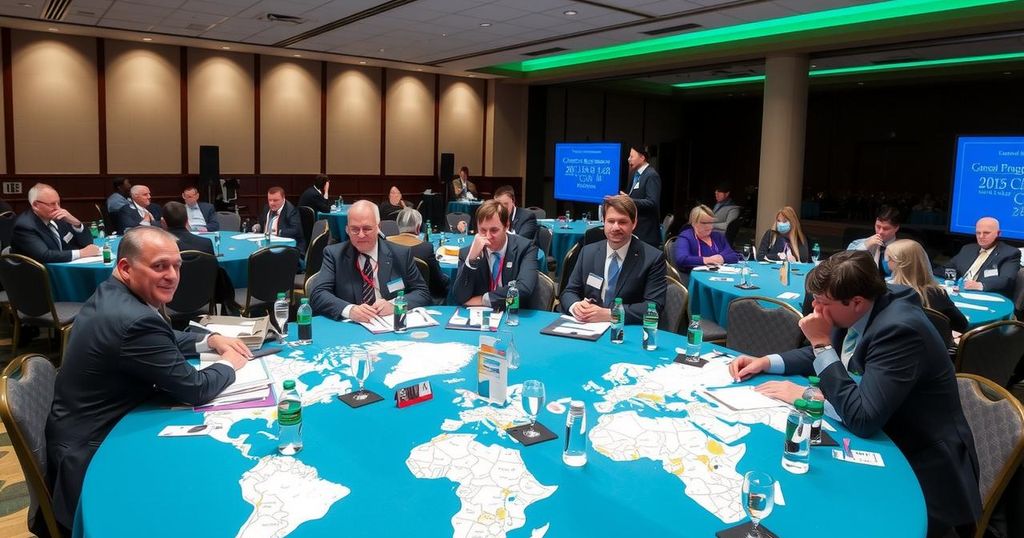Reflections on COP29: The Imperative of Radical Collaboration in Climate Action

At COP29 in Baku, Azerbaijan, over 60,000 leaders and climate advocates united to discuss climate change impacts and solutions. Focused on storytelling’s role in climate engagement, the discourse emphasized the power of narratives in shaping public perception and inspiring action. As an educator and representative of UNFCCC ECCA, the exploration of pressures caused by climate events on vulnerable populations underscored the need for radical collaboration and collective efforts toward climate resilience.
In my recent journey to Baku, Azerbaijan, for COP29, the stark contrasts of this oil-rich country and the pressing climate discussions held within its borders became apparent. Over a two-week period, thousands of leaders and activists engaged in critical dialogues about climate finance, migration, and the role of culture in promoting climate solutions. As a member of the UNFCCC ECCA steering committee and an educator, I was focused on exploring how storytelling can influence climate action and public perceptions around urgent global issues.
At COP29, more than 60,000 experts convened to discuss pressing climate challenges facing countries worldwide, particularly those experiencing significant impacts from climate change. My students, a diverse group from various international backgrounds, are profoundly concerned about these issues, as many have witnessed firsthand the destructive forces of climate events in their home countries. Through coursework exploring storytelling in climate action, we analyze how narratives shape societal values and behaviors toward ecological challenges.
At the heart of our discussions is the recognition that stories can evoke emotional connections to climate issues, leading to greater civic engagement and an embrace of scientific understanding. This concept is underscored by data that suggests storytelling is a more effective tool than traditional news media in facilitating climate awareness and action. By exploring personal narratives surrounding severe climate events, such as flooding in Pakistan and rising sea levels in Mexico, my students gain insight into the real human experiences behind these statistics.
The Paris Agreement highlights the necessity of educating societies about climate engagement. Our coursework emphasizes the significant role narratives play in shifting public perception regarding resource extraction and the impacts of global warming. My students and I reflected on insights from leading experts, discussing the challenges that climate mobility poses, as addressed in the Climate Mobility Pavilion during COP29.
The exploration of themes from Amitav Ghosh’s work reveals the political tensions surrounding climate discussions in various global contexts. Discussions of the media’s reluctance to adequately address climate change in mainstream film also illuminate the complexities we face. The hesitance of industry leaders to attribute extreme weather events to climate change stems from fears of backlash, revealing a critical need for courageous storytelling that confronts these realities.
Throughout the conference, I emphasized the importance of climate storytelling and vastly collaborative efforts to foster engagement and understanding among diverse stakeholders. Engaging conversations with advocates from precarious regions underscored the urgency of equitable global climate responses. COP29 offered a platform to witness how knowledge sharing and multi-stakeholder dialogues are essential to navigate the intricacies of climate action.
As my students prepare for their final projects synthesizing climate science and popular culture, we collectively affirm the importance of using creative storytelling as an instrument for social change. It is through these endeavors that we can reimagine our futures, especially in the face of significant challenges. Investment in such multidisciplinary approaches is fundamental to meeting the diverse needs of communities globally, as we strive to generate narratives that advocate for a thriving planet for generations to come.
The need for radical collaboration on climate change has become increasingly pressing, especially following the outcomes highlighted at COP29. During this significant gathering, climate leaders, activists, and scholars from around the globe came together in Baku, Azerbaijan, to discuss various aspects of climate action including the roles of finance, migration, and cultural influence. The juxtaposition of Azerbaijan’s oil wealth against climate discussions exposes the complexities of global climate politics, particularly regarding responsibilities of fossil-fuel-producing nations toward vulnerable populations. The overarching aims of the Paris Agreement to empower societal engagement through education and awareness underscore the value of effective storytelling in climate communication. Amid rising global temperatures and extreme weather events, individuals from various sectors are called to participate in crafting narratives that inspire collective action against climate change. This educational endeavor is not just about disseminating facts but involves connecting emotional responses with scientific data to stimulate fruitful discourse on climate solutions.
In summary, the discussions and experiences from COP29 illustrate the critical importance of collaborative and interdisciplinary approaches to climate action. By harnessing the power of storytelling and cultural narratives, we can inspire a greater understanding and mobilization of efforts across diverse communities. The need for radical collaboration in addressing climate challenges is paramount, necessitating an inclusive dialogue that integrates various perspectives from artists, scientists, activists, and policymakers. Only through such united efforts can we hope to address the urgent climate crises that threaten our world.
Original Source: news.climate.columbia.edu






